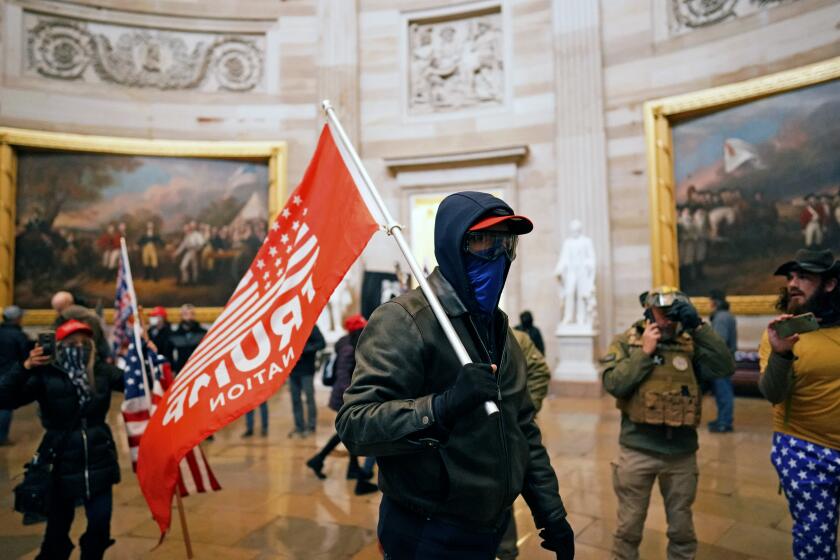Georgia man is the 2nd Jan. 6 rioter convicted of seditious conspiracy

PHOENIX — A Georgia man affiliated with the far-right Oath Keepers militia group became the second Capitol rioter to plead guilty to seditious conspiracy for his actions leading up to and through the Jan. 6, 2021, insurrection.
The sentencing guidelines for Brian Ulrich, who pleaded guilty Friday, were estimated to be 5¼ years to 6½ years in prison. He also pleaded guilty to obstructing an official proceeding.
Authorities say Ulrich participated in encrypted chats with other people affiliated with the Oath Keepers in the days before the riot, rode toward the Capitol with others in golf carts that day, marched on the grounds in a military “stack” formation, taunted police officers who were guarding the building and entered the Capitol as hundreds of then-President Trump’s supporters sought to block the certification of President Biden’s victory.
Asked by the judge whether he was pleading guilty because he was in fact guilty of the charges, Ulrich answered, “Yes, your honor.”
The 44-year-old from Guyton, Ga., agreed to cooperate with authorities investigating the riot, including testifying before a grand jury.
The seditious conspiracy prosecution is the boldest publicly known attempt by the government to prosecute those who attacked the U.S. Capitol. The Oath Keepers’ founder, Stewart Rhodes, and eight others have pleaded not guilty to seditious conspiracy and other charges.
A North Carolina man is the second Proud Boys member to plead guilty to conspiring to stop Congress from certifying the electoral college vote.
A conviction under the seditious conspiracy charge carries a maximum penalty of 20 years, compared with five years on the lesser conspiracy charge that others associated with the militia group are facing.
Those charged with seditious conspiracy are accused of working together to use force to stop the peaceful transfer of presidential power. Authorities say participants discussed their plans in encrypted chats, traveled to the nation’s capital from across the country, organized into teams, used military tactics, stashed weapons in case they thought they were needed and communicated with one another during the Jan. 6 riot.
While four other people connected with the Oath Keepers have pleaded guilty to obstruction of Congress and the lesser conspiracy charge, Ulrich is the second person to plead guilty to seditious conspiracy. Joshua A. James of Arab, Ala., pleaded guilty to the charge last month.
Nearly a year and a half after the Jan. 6 insurrection, trials for the accused have largely failed to materialize. We explore the reasons why.
Prosecutors say the group set up a “quick reaction force,” or QRF, that kept guns at a hotel in nearby Arlington, Va., and that they were prepared to bring the weapons into Washington if Rhodes or associates believed the need arose. Days before the attack, one defendant suggested getting a boat to ferry weapons across the Potomac River. In the end, the QRF teams didn’t bring guns into Washington.
More than 780 people have been charged with federal crimes related to the Jan. 6 riot. More than 250 of them have pleaded guilty, mostly to misdemeanors. About 160 of them have been sentenced.
More to Read
Get the L.A. Times Politics newsletter
Deeply reported insights into legislation, politics and policy from Sacramento, Washington and beyond. In your inbox three times per week.
You may occasionally receive promotional content from the Los Angeles Times.












